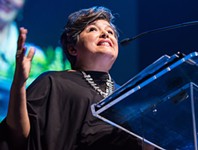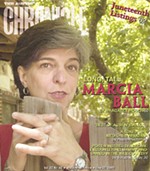Nourishment for the Soul
Correo Aereo Deepens, Ripens, and Grows
By Belinda Acosta, Fri., Dec. 22, 2000

Perhaps the best way to talk about Correo Aereo is to talk about love. Love, it seems, has been a central part of their lives and work. Not the superficial, "We Are the World" kind of love, or the commercialized, romantic love of Valentine's Day hearts and flowers, but a love that transcends language. Love that has its own logic, its own way of making itself known. For Austin's musical duo Correo Aereo, Abel Rocha and Madeleine Sosin, love is expressed through their mutual respect for music -- playing, listening, sharing, learning, and making music with each other and other musicians.
"Music is a deep thing in my life," says Sosin. "It's saved my soul so many times. It's uplifted me, it's carried me, it's healed me, comforted me, challenged me, kicked my ass. It's done every good thing that love can do. I think it's an essential part of us that is so necessary."
Rocha and Sosin arrived in Austin 10 years ago. They set up temporary housekeeping at the Austin Motel (pre-renovation), sharing quarters with cockroaches and "all the beautiful transvestites," Sosin recalls. They knew no one in town, but were drawn by Austin's reputation as a music city, and the desire to see what it would be like to "unfold and be open and alive to what was here."
There were many things in Austin at the outset of the Nineties, but folk music from Mexico and Central and South America wasn't something found readily in abundance, if at all. Rocha's achingly clear tenor alongside Sosin's velvety vocals, combined with the former's nimble work on harp, guitar, cuatro, quinta huapanguera, and cajon, and the latter's bewitching violin, entranced more than a few locals, who found themselves having a visceral reaction to Correo Aereo's alternately joyous and sorrowful music. When they hit town, Rocha and Sosin had a hard time finding like-minded musicians and performers to play with. That's changed.
"We've met all kinds of amazing and wonderful people and opportunities here and elsewhere," says Sosin. "There are so many amazing musicians and great artists who live here. We've been really fortunate to start making music with them."
One of those opportunities came last year, when, while performing at Curra's Restaurant on the south side, they happened upon a group of musicians.
"They were all talking, obviously reunited friends, and we thought, 'Ah, we won't go in there. Maybe they just want to talk,'" recounts Sosin. "Then we thought, 'Oh, what the f**k, we'll just go in there, play one song -- if it soothes them, we'll stay, and if not, we'll scram real fast.'
"So we went in there and they wouldn't let us leave the room the entire night. It was so beautiful ... one of those really precious moments where you come together with lots of soulmates."
Turns out two members of the party were Joey Burns and John Convertino of Calexico, in town for South by Southwest. That chance meeting led to an invitation for Correo Aereo to participate in a special media project Burns and Convertino were leading in Amsterdam with seven other musicians from around the world. The group collaborated for four days on a two-hour live performance at Club Paradiso, telecast by VPRO Television and Radio, and simulcast on the Internet, which can be viewed at the Correo Aereo Web site (www.correoaereo.com). They also took the opportunity to do a short European tour. They plan to return in 2001.
Locally, Correo Aereo have been equally embraced, both by fans and other musicians. Although they perform live and tour nationally and now internationally, loyal fans couldn't help notice the long period between their first album, 1992's Provinces (cassette-only until it was remastered for CD in '96) and their second release, the recent Lo Que Me Dijo el Viento. Seems it was Davíd Garza who nudged them toward making their next album.
"We were at a party and he said, 'What's taking so long?'" laughs Sosin. "'I want another CD! When is the next CD coming out?'"
"When we have the money" was the unfortunate, and oft-times typical, reply.
"He said, 'Okay. That's all you need? I'll give you three days in the studio and in exchange, you're going to play at my wedding.' It was his love and his faith that helped get this album made."
Lo Que Me Dijo El Viento, which translates as "What the Wind Told Me," once again features Correo Aereo's trademark reworking of traditional music from Venezuela, Argentina, Peru, and Mexico, along with two original tunes written and performed by Rocha. Also featured on the album are Rob Halverson on electric bass and guitar, Rosie Ochoa on stand-up bass, and both Mark Hallman and Mitch Watkins, who had a hand in engineering and mixing the final product. Work on the album began in 1999, but wasn't finished until 2000, mainly because of lack of funds, but also because the duo wanted to create something better than their first effort.
"I think I'm going to make CDs as long as I really, truly, honestly feel that I'm doing something better than the last one," says Rocha. "But if not, I'm not going to be producing, producing, producing. I don't care for that, and in a certain way, I don't really care very much that it took so long [for the second CD] to come out. People may be very happy with what you did 10 years ago, but if you feel that you're not doing things better, it's better to chill out, and observe the process."
Though Austin has been a good place for Rocha and Sosin to meet and work with other musicians, they've also seen a lot of changes in this city, some personal, some professional. One of the most damaging experiences was the theft of Sosin's violin -- stolen from its case during a rainstorm, as they were checking into a Fort Worth hotel at midnight to play a school at 7am the next morning.
"That almost did me in," says Sosin sadly. "They stole it in a rainstorm without the case. It's like having your child kidnapped naked in a blizzard or something."
Watching Sosin play the violin, one understands the deep connection she makes with her instrument. It was the only violin she'd ever played, specially made for her by a violinmaker who wanted her to have one of his violins.
"I used to go to his shop everyday after school for a year and watch and smell it being born," remembers Sosin. "It was my baby! My wish is that it ended up with someone who has the talent, but not the money ... it was a beautiful instrument, a soulful instrument."
Another change, one that may surprise some fans, is the fact that Rocha and Sosin are no longer married.
"People seem shocked and awed that we've stayed together," says Sosin. "We're still very much artistically married, even though we had to let go of the other marriage. A duo is an intense, intimate partnership. There's a musical chemistry we've always had, and that we still have."
"I think having a philosophy, a shared commitment to the work, is very important," adds Rocha.
Although Austin is hyped as the "Live Music Capital of the World," and their base of friends and supporters has broadened, Rocha and Sosin believe there's a ceiling in Austin that they haven't quite been able to crack. It's a ceiling they don't encounter when they tour.
"I think the concert scene has been absent for a long time," posits Rocha. "There's a lot of gigging going on in clubs, but the concert scene is nearly absent."
Because of this, their music is often relegated to restaurants, where music is the background to people eating and talking. The duo is quick to mention the great support they've received from restaurants like Curra's, the Treehouse, Clay Pit, and venues like the Cactus Cafe, but maintain that a concert scene for more intimate musical experiences is sorely lacking.
"People really listen to music in other places more than they do here," asserts Sosin. "We have so much music here, I think sometimes people take it for granted. There have been months when we've been home too long, doing restaurant gigs, so that when we go on the road, it's always shocking to us at first, because we're not used to having people really listen and appreciate [the music].
"It doesn't take long to get used to it. And then we get real used to it, real fast, and then we come home. I think anybody in Austin who tours knows this."
The closing of Chicago House several years back was a significant event in Rocha's mind, the just-off Sixth Street venue being well known for its the appreciation and showcasing of "quiet" music. Fortunately, other venues, away from Austin's entertainment district, are opening up for duos like Correo Aereo.
"I think Austin is getting better and better musically," says Sosin. "When you see a human being ripen, see how people deepen and grow in all their levels of expression and become masterful, it's such a great thing."
Fans of Correo Aereo couldn't agree more. ![]()







